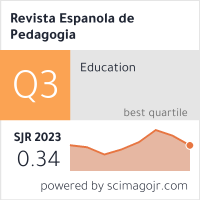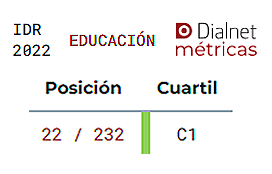The role of religious education in curriculum designing
Abstract
Nowadays religious education in the United Kingdom is reduced to explain the different religions in the world and it does not go into religious sensibility" in any depth. Thus, in many schools it is often said that an atheist can be a very good teacher of religious education. However, only a person who is aware of religious sensibility and who knows how to explain it can be a good teacher of religious education. Only then we could understand that it has both a material and spiritual dimension, a specific and a universal connotation and that it is both local and global in perspective. At present, religious education is a highly marginalised subject in curriculum designing because the actual trend consists of only taking into account the knowledge that can be presented in cause and effect and in problem/solution terms. Therefore, the current trend consists of keeping the human being constantly busy. However, this model of life does not answer mens transcendental questions such as why", how" and for what". Religions have traditionally answer these questions through God and through a transcendental existence. Traditional religions share some basic commonality. For example, they state the human being has a transcendental reality and they believe in a spiritual dimension of the human personality. In some religions (Judaeo-Christian and Islamic tradition), God provides men with the Absolutes of truth, justice, mercy and love. It is well known by us all that a kid has an innate knowledge of these concepts (if someone slaps him unjustly, he reacts against it). That means that he has not learnt these Absolutes, but someone has provided him with these innate concepts. Traditional religions believe that this someone" is God. Therefore these ideals are not only innate, but also absolute, universal, transcendent, unchanging and perpetual. The other social rules have been developed by men, who have taken these ideals as models. However, social rules are neither universal nor unchanging. Thus, innate norms should help students to formulate basic concepts for all branches of knowledge.
Everybody, no matter his/her religion, knows these concepts of love, justice, truth and mercy. That means that religious sensibility is not exclusive for a few individuals. Likewise, although nowadays the trend is to underline aesthetic sensibility, this sensibility is not enough if it is not accompanied by the individuals sense of justice, truth and righteousness. By the religious sensibility we mean both the global culture of what is good" and the balanced knowledge of all the Absolutes and norms of perfection, i.e., if a person wants to be human", he/she must temper justice with mercy in order no to be cruel. Unfortunately, the western system of education is separated into two roots: the religious and the liberal root, and it is the liberal root that is prevailing. At present, knowledge is considered the only means to understand the truth. Religious education should fight against this statement, for the human being not only be considered as a logical thinking unit (mind) but as a natural and supernatural being (heart). It is the heart through which divine grace descends on the human soul and where the struggle between the good and the evil takes place. That is why religious education" should not remain a subject on information about the different religions of the world, but a central subject of the curriculum providing an integrated view of the world and a concept of the human being which includes his/her relationship with God and with nature. Only then students will be able to understand science, humanities and social sciences. Likewise, they will realise that, although our existence in this world is temporary, we must take care of it and improve it for the coming generations.
Key words: Religious education and personal engagement; God and the spiritual self of human being; Cultivation of religious sensibility; Role of religion in the curriculum.
Citación recomendada | Recommended citation
Ashraf., S. A.
(2002)
.
The role of religious education in curriculum designing.
Revista Española de Pedagogía, 60(222).
https://www.revistadepedagogia.org/rep/vol60/iss222/8
Licencia Creative Commons | Creative Commons License
Esta obra está bajo una licencia internacional Creative Commons Atribución-NoComercial 4.0.
This work is licensed under a Creative Commons Attribution-NonCommercial 4.0 International License
Palabras clave | Keywords
Religious education and personal engagement; God and the spiritual self of human being; Cultivation of religious sensibility; Role of religion in the curriculum.








